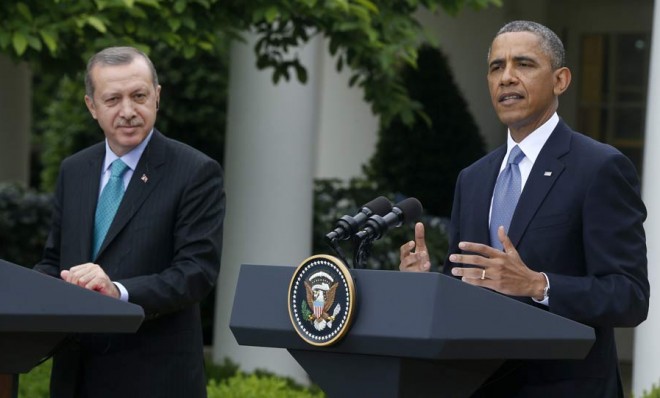Are Obama and Turkey's Erdogan united on Syria?
Both leaders want Assad gone. The tension is over how far each is willing to go

A free daily email with the biggest news stories of the day – and the best features from TheWeek.com
You are now subscribed
Your newsletter sign-up was successful
On Thursday, President Barack Obama stood next to Turkish Prime Minister Recep Tayyip Erdogan in the Rose Garden, shielded from falling rain by a pair of umbrella-wielding Marines. It was an awkward moment for an awkward task: Announcing a united front on Syria despite underlying differences over policy.
To be clear, both want to see Bashar al-Assad thrown out of power. It's just that Erdogan wants the international community to be more aggressive about it — preferably by instituting no-fly zones and providing "lethal" assistance to rebels, writes Fadi Hakura, associate fellow of London-based think tank the Turkey Project, at CNN.
Turkey's position is understandable. The country shares a border with Syria that stretches for more than 500 miles, which at least 400,000 Syrian refugees have crossed since the conflict started two years ago. In the Turkish border town of Reyhanli, 43 people were killed by car bombs on Saturday, causing Turkey's deputy prime minister to blame the "usual suspects" — i.e., members of the Syrian regime looking to target refugees.
The Week
Escape your echo chamber. Get the facts behind the news, plus analysis from multiple perspectives.

Sign up for The Week's Free Newsletters
From our morning news briefing to a weekly Good News Newsletter, get the best of The Week delivered directly to your inbox.
From our morning news briefing to a weekly Good News Newsletter, get the best of The Week delivered directly to your inbox.
Erdogan is under pressure at home to end the Syrian conflict. As Salon's Brian Katulis notes, he is also in competition with Iran, Saudi Arabia, Qatar, and Jordan to ensure that friendly opposition groups come to power when the fighting is over.
The United States, on the other hand, has been very cautious about intervening in Syria, even with hawks in Congress and the media calling for military action after the Assad regime allegedly crossed the Obama administration's "red line" of using chemical weapons.
That dynamic resulted in a careful dance between Obama and Erdogan over what to do in Syria. When asked by a reporter how a lack of U.S. military involvement would affect the war in the future, Erdogan said this:
You are talking about the part of the glass which is empty. I like to look at things with the glass half full instead of half empty. What we would like to see is the sensitivity on the part of the international community with respect to what’s going on in Syria. And this is what we, as Turkey, are striving for, and I do believe that the United States is doing the same, and other countries, the United Nations Security Council, the Arab League.
Our aim is to accelerate this process, and I will be visiting other countries, my foreign minister will be visiting other countries, just to see how we can speed things up in a way which will prevent the death of more people, and in a way which will ensure a transition to a democratic system in Syria. [WhiteHouse.gov]
Instead of talking about how to "speed things up," Obama was performing the diplomatic equivalent of slamming on the brakes. When asked about evidence that Assad had crossed the "red line," Obama responded:
A free daily email with the biggest news stories of the day – and the best features from TheWeek.com
As we gather more evidence and work together, my intention is to make sure that we're presenting everything that we know to the international community as an additional reason, an additional mechanism, for the international community to put all the pressure that they can on the Assad regime, and to work with the opposition to bring about that political transition. [WhiteHouse.gov]
Still, perhaps the two leaders are at least agreeing to disagree respectfully. As The Washington Post's Kevin Sullivan points out, Erdogan wasn't this diplomatic after an attack earlier this month in the town of Baniyas, where initial reports said 77 people were killed by pro-Assad forces.
"I wonder how long you will turn a blind eye to this massacre. Damn your international policies!" Erdogan said, according to the Post, referring to the international community — which, presumably, included the United States.
Today, they kept most of their objections to themselves, rallying behind Obama's message: "We both agree that Assad needs to go."
Keith Wagstaff is a staff writer at TheWeek.com covering politics and current events. He has previously written for such publications as TIME, Details, VICE, and the Village Voice.
-
 Political cartoons for February 14
Political cartoons for February 14Cartoons Saturday's political cartoons include a Valentine's grift, Hillary on the hook, and more
-
 Tourangelle-style pork with prunes recipe
Tourangelle-style pork with prunes recipeThe Week Recommends This traditional, rustic dish is a French classic
-
 The Epstein files: glimpses of a deeply disturbing world
The Epstein files: glimpses of a deeply disturbing worldIn the Spotlight Trove of released documents paint a picture of depravity and privilege in which men hold the cards, and women are powerless or peripheral